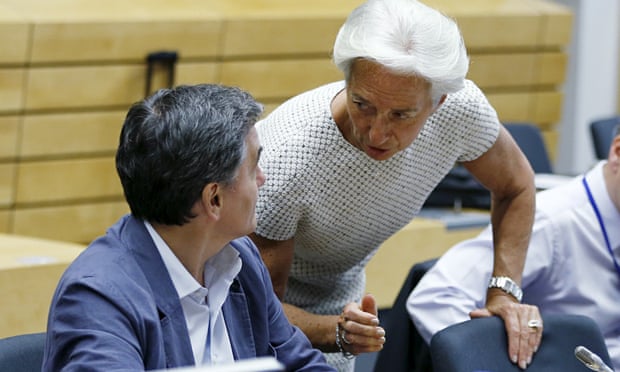Ian Traynor in Brussels Sunday 12 July 2015 08.37
Last-ditch negotiations to resume on Sunday after Eurozone's fiscal hawks put up fierce resistance to Alexis Tsipras’s rescue plan
Greek finance minister Euclid Tsakalotos listens to IMF managing director Christine Lagarde during a Euro group meeting in Brussels, Belgium, on Saturday. Photograph: Francois Lenoir/Reuters

Greece’s final attempt to avoid being kicked out of the euro by securing a new three-year bailout worth up to €80bn ran into a wall of resistance from the Eurozone's fiscal hawks on Saturday.
Finland rejected any more funding for the country and Germany called for Greece to be turfed out of the currency bloc for at least five years.
The last-chance talks between the 19 Eurozone finance ministers in Brussels ended at midnight, as they struggled to draft a policy paper for national leaders at yet another emergency summit on Sunday that was billed as the decisive meeting.
With Greece on the edge of financial and social implosion, Eurozone finance ministers met to decide on the country’s fate and on what to do about its debt crisis, after experts from the troika of creditors said that new fiscal rigour proposals from Athens were good enough to form “the basis for negotiations”.
But the German finance minister, Wolfgang Schäuble, dismissed that view, supported by a number of northern and eastern European states. “These proposals cannot build the basis for a completely new, three-year [bailout] programme, as requested by Greece,” said a German finance ministry paper. It called for Greece to be expelled from the Eurozone for a minimum of five years and demanded that the Greek government transfer €50bn of state assets to an outside agency for sell-off.
Timo Soini, the nationalist True Finns leader, meanwhile, threatened to bring down the government in Helsinki if Alex Stubb, the finance minister, agreed to a new bailout for Greece. Stubb apparently came to the crunch meeting on a new bailout without a mandate to agree one.
“The hawks are very vocal,” said an EU diplomat. “It’s very tough.” Berlin also demanded stronger and more intrusive powers for outside monitors to police the economic and fiscal reforms that Alexis Tsipras, the leftist Greek prime minister, would need to commit to to secure the new bailout.
Saturday night’s talks were not to agree on a third bailout, but were negotiations on whether to launch more talks on Greece’s third rescue package in five years. The ministers faced formidable problems, said Schäuble, who argued debt relief for Greece, broadly seen as essential, was banned by the EU treaties: “Athens’s proposals are far from sufficient. The funding gaps are way beyond anything we’ve seen so far,” he said.
The hard line was echoed by Peter Kazimir, finance minister of Slovakia, who said that new austerity measures tabled by Athens were already past their sell-by date.
The Eurozone has been united for five months in the negotiations with Tsipras, but with the stakes rising greatly in the last 10 days, major divisions have surfaced, with the French working tirelessly to save Greece and the hardliners now pushing Greece’s expulsion for the first time openly.
The European commission and the European Central Bank issued dire warnings that a failure to grant Greece new rescue funds of up to €78bn would put the country on a trajectory of complete banking and financial collapse.
The widening gulf between Eurozone hawks and doves paves the way for an acrimonious summit on Sunday, with France and Italy lining up against Germany and the northern and eastern Europeans. Matteo Renzi, the Italian prime minister, is expected to tell chancellor Angela Merkel that enough is enough and that Greece should not have to put up with any more humiliation.
Merkel is under intense pressure from the Americans not to “lose” Greece and is worried about her own legacy. But Greece fatigue is becoming endemic in Germany, and she faces growing unrest in her party ranks where Schäuble’s hard line is popular. She was said to have endorsed Schäuble’s tough position.
If the talks break down irretrievably and Greece is allowed to slide into even greater chaos, relations between Berlin and Paris will come under tremendous strain. Michel Sapin, the French finance minister, lauded Tsipras for putting his austerity proposals before parliament and saw the moves of the past few days as “positive”.
Tsipras won a sweeping majority with the support of opposition parties, but many in his Syriza movement defected, leading to speculation that he could either call new elections or ditch his hardliners and lead a new “national unity” government.
On Thursday, Tsipras performed a remarkable U-turn and accepted more austerity measures than had been rejected in the referendum he called for five days earlier. The prompt volte-face confounded negotiators.
Greece nears euro exit as bailout talks break up without agreement | World news | The Guardian
![The [Greek] European Tragedy](https://blogger.googleusercontent.com/img/b/R29vZ2xl/AVvXsEiWKI5s90SFm1wWTk6bs4p7CgslaC2SnYPsrZhb-B-smOufNNCSxCvpBLI9hOB-LsXZjir_PNmEiMk2-E62F3xkg96IoC6QFAaZAnPRTVH340IN9WBRmWJqPkjWlgyRj3zpALp7h6hvA58/s920/GkBack_new.jpg)